11 Music Reviews
by dave heaton, john wenzel
Anamude, Urban Comfort EP (First Flight)
 "I walked right through that door/tried not to run when my heart was sore," Anamude (aka Anna Hortillosa) sings at the start of her Urban Comfort EP, while strumming a blues-country passage on her guitar. That song, "Excerpt," cuts off before you get a context for why her heart is in the shape it is. That feeling of being left on an edge, of being given something puzzling, runs through me for the entirety of this 20-minute, 6-track EP. Hortillosa plays folk-ish acoustic music that has the immediacy and charm of that style of music but none of the overly obvious lyrics. Call her an impressionist folk singer or what have you, but she delivers feelings, moods, colors more than stories…glimpses of a moment more than the moment itself. Her delicate voice aches with hurt and then reassures us by sounding gorgeous. And she sings with a phrasing that makes everything she says sound like a question.--dave heaton
"I walked right through that door/tried not to run when my heart was sore," Anamude (aka Anna Hortillosa) sings at the start of her Urban Comfort EP, while strumming a blues-country passage on her guitar. That song, "Excerpt," cuts off before you get a context for why her heart is in the shape it is. That feeling of being left on an edge, of being given something puzzling, runs through me for the entirety of this 20-minute, 6-track EP. Hortillosa plays folk-ish acoustic music that has the immediacy and charm of that style of music but none of the overly obvious lyrics. Call her an impressionist folk singer or what have you, but she delivers feelings, moods, colors more than stories…glimpses of a moment more than the moment itself. Her delicate voice aches with hurt and then reassures us by sounding gorgeous. And she sings with a phrasing that makes everything she says sound like a question.--dave heaton
Defari, Odds & Evens (High Times Records)
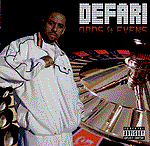 When you see that three tracks on L.A. rapper Defari's second album Odds and Evens feature members of Tha Alkaholiks, and a few other tracks are produced by Tha Liks' E-Swift, you expect partying and having fun at all costs to be what Defari's up to. And indeed, tracks like "Pour More Likwit" and "Slumpy" (the middle section of the album, essentially) are straight-up party jams, about doing your thing (drinking, smoking, what have you) and not caring what anyone else thinks. But Defari's also all-about making raw hip-hop tracks that reflect his experiences and show off his skills on the mic. Odds and Evens has the low-key but rugged feeling of Defari's fellow Californians Dilated Peoples (that group's Evidence produced 5 tracks and rhymes on two), with sparse, class-soul-inflected tracks. Much of the lyrical content is more about impressing with his skills (and impress he often does) than sending a particular message, yet Defari has more to say than you might expect, mostly about integrity, growth and the maintenance of relationships with family and friends. He even drops a few potent societal critiques here and there. "Behold My Life," one of the songs is titled, and it's clear that his music comes out of an attempt to put his life experiences on wax, to use what he's learned and deliver it in a song. Odds and Evens is party music, sure, but with heart. Defari will build a chorus around spelling out his name, but he's not afraid to rap about how proud he is to be his father's son, either, and that's refreshing.--dave heaton
When you see that three tracks on L.A. rapper Defari's second album Odds and Evens feature members of Tha Alkaholiks, and a few other tracks are produced by Tha Liks' E-Swift, you expect partying and having fun at all costs to be what Defari's up to. And indeed, tracks like "Pour More Likwit" and "Slumpy" (the middle section of the album, essentially) are straight-up party jams, about doing your thing (drinking, smoking, what have you) and not caring what anyone else thinks. But Defari's also all-about making raw hip-hop tracks that reflect his experiences and show off his skills on the mic. Odds and Evens has the low-key but rugged feeling of Defari's fellow Californians Dilated Peoples (that group's Evidence produced 5 tracks and rhymes on two), with sparse, class-soul-inflected tracks. Much of the lyrical content is more about impressing with his skills (and impress he often does) than sending a particular message, yet Defari has more to say than you might expect, mostly about integrity, growth and the maintenance of relationships with family and friends. He even drops a few potent societal critiques here and there. "Behold My Life," one of the songs is titled, and it's clear that his music comes out of an attempt to put his life experiences on wax, to use what he's learned and deliver it in a song. Odds and Evens is party music, sure, but with heart. Defari will build a chorus around spelling out his name, but he's not afraid to rap about how proud he is to be his father's son, either, and that's refreshing.--dave heaton
Fiel Garvie, Leave Me Out of This (Words on Music)
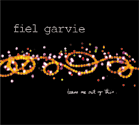 UK band Fiel Garvie's second full-length album Leave Me Out of This sounds good quiet and better when turned up loud. They build a wall of sound that overtakes you, body and soul, pulling you along on an enrapturing journey. Leave Me Out of This is filled with dreamy songs that are evocative of ambient-pop groups like the Cocteau Twins but often follow a trajectory that's more rock. Their song explode on you, but do so gently. Guitars, keyboards, bass, drums and "dislocated noises" all wind themselves together in a way that's at once soothing and explosive, controlled and unrestrained. Fiel Garvie rock their way through lullabies and daydreams, massaging you forcefully. Lead singer Anne sings softly in you ear, and then echoes the songs' crescendos by belting the words out with an unusual, off-kilter lilt reminiscent of a less over-the-top Kate Bush. Leave Me Out of This musically shoots you up near the stars, yet its lyrics are more earthbound, articulating the pain and confusion behind human relationships. "I feel so bad about you/think too much about you," Anne sings at the start of one song. The lyrics throughout Leave Me Out of This is preoccupied with the feeling of getting so wrapped up in someone else that you're floating on a wave that could lead to either pleasure or doom, and will likely lead to both. That feeling fits right in with the music; they perfectly capture the dizzying of being head over heels, of being lost in something new and uncertain.--dave heaton
UK band Fiel Garvie's second full-length album Leave Me Out of This sounds good quiet and better when turned up loud. They build a wall of sound that overtakes you, body and soul, pulling you along on an enrapturing journey. Leave Me Out of This is filled with dreamy songs that are evocative of ambient-pop groups like the Cocteau Twins but often follow a trajectory that's more rock. Their song explode on you, but do so gently. Guitars, keyboards, bass, drums and "dislocated noises" all wind themselves together in a way that's at once soothing and explosive, controlled and unrestrained. Fiel Garvie rock their way through lullabies and daydreams, massaging you forcefully. Lead singer Anne sings softly in you ear, and then echoes the songs' crescendos by belting the words out with an unusual, off-kilter lilt reminiscent of a less over-the-top Kate Bush. Leave Me Out of This musically shoots you up near the stars, yet its lyrics are more earthbound, articulating the pain and confusion behind human relationships. "I feel so bad about you/think too much about you," Anne sings at the start of one song. The lyrics throughout Leave Me Out of This is preoccupied with the feeling of getting so wrapped up in someone else that you're floating on a wave that could lead to either pleasure or doom, and will likely lead to both. That feeling fits right in with the music; they perfectly capture the dizzying of being head over heels, of being lost in something new and uncertain.--dave heaton
The Frenchmen, self-titled 7" (Shelflife)
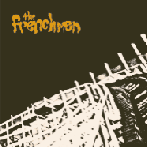 There's a rollercoaster on the cover of The Frenchmen's debut 7", and the music is like one: quick, exciting, and over too soon. Four sweet, melodic pop songs (what the kids today call "twee") played like they're rambunctious garage-rock, fast and loose. The drums are on fire, the guitars revved up and on the road, and the singers have pretty voices and throw in lots of "ba ba ba"s. Crushes and broken hearts are the likely impetus behind pop songs and punk rock songs alike these days. The Frenchmen tackle both in their own endearing way.--dave heaton
There's a rollercoaster on the cover of The Frenchmen's debut 7", and the music is like one: quick, exciting, and over too soon. Four sweet, melodic pop songs (what the kids today call "twee") played like they're rambunctious garage-rock, fast and loose. The drums are on fire, the guitars revved up and on the road, and the singers have pretty voices and throw in lots of "ba ba ba"s. Crushes and broken hearts are the likely impetus behind pop songs and punk rock songs alike these days. The Frenchmen tackle both in their own endearing way.--dave heaton
The Heavenly States, Self-titled (Future Farmer Recordings)
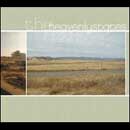 If it's possible to be "all over the map" in a good
way, I'm tempted to say Heavenly States are All Over
the Map. Unfortunately, it's not truly possible, so
this is a liability to their sound. It's impressive to
switch effortlessly from modern pop-rock ("The Story
Of") to near-emo radio fodder ("Carwash") to baroque,
downtrodden indie folk ("My Friends"). Impressive, and
a bit weird. Are these guys (actually, two guys and a
girl) just San Francisco hipsters slumming it in
Three-chord Guitarland? Neo-folkies experimenting with
distortion? Top 40 wannabes that grew up on Sebadoh
and Stone Temple Pilots? It's hard to tell. Their press bio links them with Bill Callahan and The Brothers Oldham, which is to say, they've toured with
and played in those folks' bands before. But other
than the obvious indie credibility that lends, there
are no logical ties between (Smog), Bonnie "Prince"
Billie and The Heavenly States. Whereas the former
artists invariably sound off-the-cuff and spontaneous,
The Heavenly States never sound anything but smooth,
even and deliberate. Not bad things, any of them, but
decidedly on the other end of the spectrum from Drag
City-esque monkey business, (although all of the
aforementioned bands, including The Heavenly States,
come off as painfully self-conscious). The Heavenly
States have crafted an ambitious debut - crisp,
textured and melodic as hell. Still, there's an
off-putting unctuousness to the songwriting that no
amount of indie-royalty connections or production
tricks can hide.--John Wenzel
If it's possible to be "all over the map" in a good
way, I'm tempted to say Heavenly States are All Over
the Map. Unfortunately, it's not truly possible, so
this is a liability to their sound. It's impressive to
switch effortlessly from modern pop-rock ("The Story
Of") to near-emo radio fodder ("Carwash") to baroque,
downtrodden indie folk ("My Friends"). Impressive, and
a bit weird. Are these guys (actually, two guys and a
girl) just San Francisco hipsters slumming it in
Three-chord Guitarland? Neo-folkies experimenting with
distortion? Top 40 wannabes that grew up on Sebadoh
and Stone Temple Pilots? It's hard to tell. Their press bio links them with Bill Callahan and The Brothers Oldham, which is to say, they've toured with
and played in those folks' bands before. But other
than the obvious indie credibility that lends, there
are no logical ties between (Smog), Bonnie "Prince"
Billie and The Heavenly States. Whereas the former
artists invariably sound off-the-cuff and spontaneous,
The Heavenly States never sound anything but smooth,
even and deliberate. Not bad things, any of them, but
decidedly on the other end of the spectrum from Drag
City-esque monkey business, (although all of the
aforementioned bands, including The Heavenly States,
come off as painfully self-conscious). The Heavenly
States have crafted an ambitious debut - crisp,
textured and melodic as hell. Still, there's an
off-putting unctuousness to the songwriting that no
amount of indie-royalty connections or production
tricks can hide.--John Wenzel
Kronos Quartet with David Barron, Harry Partch: U.S. Highball (Nonesuch)
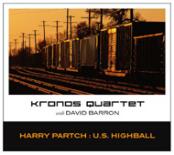 The Kronos Quartet are the only classical musicians I can think of who release EPs. It's a mark of their hipness I suppose, but also that they aim their music at regular people, not just those who can afford tuxedoes and fancy gowns. U.S. Highball is one of three 30-minute EPs the group released at the same time this summer, each their version of a work by an influential 20th Century composer. Here they tackle Ben Johnston's arrangement of Harry Partch's U.S. Highball, where the avant garde composer used a vocalist to relate his story of riding across country on a train. Kronos's version uses vocalist David Barron, whose operatic, theatrical singing gives the tale a completely surreal feeling while also highlighting the class issues inherent in Partch's song by sounding like a rough-and-rumble version of an opera singer. Barron's voice has center stage here, yet the quartet play around him both delicately and erratically, in a way that both propels the piece along (like a train) and accentuates the off-kilter vibe hat it has. Here's another magnetic, unconventional recording to add to lengthy list of fascinating recordings the Kronos Quartet has produced over the last 30 years.--dave heaton
The Kronos Quartet are the only classical musicians I can think of who release EPs. It's a mark of their hipness I suppose, but also that they aim their music at regular people, not just those who can afford tuxedoes and fancy gowns. U.S. Highball is one of three 30-minute EPs the group released at the same time this summer, each their version of a work by an influential 20th Century composer. Here they tackle Ben Johnston's arrangement of Harry Partch's U.S. Highball, where the avant garde composer used a vocalist to relate his story of riding across country on a train. Kronos's version uses vocalist David Barron, whose operatic, theatrical singing gives the tale a completely surreal feeling while also highlighting the class issues inherent in Partch's song by sounding like a rough-and-rumble version of an opera singer. Barron's voice has center stage here, yet the quartet play around him both delicately and erratically, in a way that both propels the piece along (like a train) and accentuates the off-kilter vibe hat it has. Here's another magnetic, unconventional recording to add to lengthy list of fascinating recordings the Kronos Quartet has produced over the last 30 years.--dave heaton
Love, The Forever Changes Concert (Snapper)
 One of the best rock albums of the 1960s gets revisited on The Forever Changes Concert, a recording of a January 2003 London stop on the Forever Changes tour, which found a reunited version of Love playing their 1967 album Forever Changes in its entirety. This lineup is really just Arthur Lee backed by the band Baby Lemonade, but that's good enough for fans of the band and the album. Affairs like this are always first and foremost gifts for the fans. No one unfamiliar with Forever Changes is likely to want this album, and anyone who hasn't heard it should go to it first. Its reputation as a classic is well-deserved; it's filled with fantastic songs that blend orchestral pop with sweeping yet psychedelic arena rock. The album has both a bluesy edge and graceful, string-laden melodies. The crowd screams on The Forever Changes Concert and the glee with which Lee and the band perform the material is a testament to how much the songs mean to people. This re-recording is then a portrait of that love as much as anything else. But it also isn't just a nostalgia trip, as this performance feels as alive as the original recording did, and the musicians are just as proficient. "A House is Not a Motel" gathers a rock n' roll punch to rival that of the original, and the album's slower moments are just as pretty and haunting, even when Lee is singing lead on songs originally sung by the late Bryan McLean. Lee's singing on "Old Man" is especially affecting, as is his post-song statement, "I wish Bryan was here to sing that song." The album-closing "You Set the Scene" is by far this concert's highlight: a sparkling rendition, filled with all of the emotion and mystery of the original. In moments as potent as those, The Forever Changes Concert stands as a testament to the original album and its lasting power, while also entertaining in the here and now.--dave heaton
One of the best rock albums of the 1960s gets revisited on The Forever Changes Concert, a recording of a January 2003 London stop on the Forever Changes tour, which found a reunited version of Love playing their 1967 album Forever Changes in its entirety. This lineup is really just Arthur Lee backed by the band Baby Lemonade, but that's good enough for fans of the band and the album. Affairs like this are always first and foremost gifts for the fans. No one unfamiliar with Forever Changes is likely to want this album, and anyone who hasn't heard it should go to it first. Its reputation as a classic is well-deserved; it's filled with fantastic songs that blend orchestral pop with sweeping yet psychedelic arena rock. The album has both a bluesy edge and graceful, string-laden melodies. The crowd screams on The Forever Changes Concert and the glee with which Lee and the band perform the material is a testament to how much the songs mean to people. This re-recording is then a portrait of that love as much as anything else. But it also isn't just a nostalgia trip, as this performance feels as alive as the original recording did, and the musicians are just as proficient. "A House is Not a Motel" gathers a rock n' roll punch to rival that of the original, and the album's slower moments are just as pretty and haunting, even when Lee is singing lead on songs originally sung by the late Bryan McLean. Lee's singing on "Old Man" is especially affecting, as is his post-song statement, "I wish Bryan was here to sing that song." The album-closing "You Set the Scene" is by far this concert's highlight: a sparkling rendition, filled with all of the emotion and mystery of the original. In moments as potent as those, The Forever Changes Concert stands as a testament to the original album and its lasting power, while also entertaining in the here and now.--dave heaton
The Meeting Places, Find Yourself Along the Way (Words on Music)
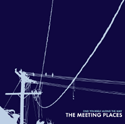 If Sonic Youth ever falls into a deep, dark hole of
shoegazer-lovin', Jesus & Mary Chain-worshippin' lust,
they'll feel painfully behind the curve, as The
Meeting Places will have already beat them to it. On
their debut, this Los Angeles-based quartet doesn't so
much play their guitars as coax them, eliciting gauzy
walls of multi-textured squall that would embarrass
Slowdive. In fact, the band goes as far as to compare
their songs to a particular era of Slowdive.
Never having heard Slowdive, I'm left to conclude that
The Meeting Places aren't breaking much new ground.
That's fine if you have a perpetual erection for
wine-and-pills music, but I do not. As good as this album is - with clean, dynamic production by Earlimart's overrated
producer-of-the-minute Aaron Espinoza - its genre
hallmarks are completely lost on me. Structures seem
overly repetitive and lyrics read like high school
poetry. The melodies are nice enough, but the vocals
have no inherent personality. It's tasteful but mild,
and never begs for repeated listens as anything other
than background music. A portrait of a talented band
that's treading familiar ground and reveling in it.--John Wenzel
If Sonic Youth ever falls into a deep, dark hole of
shoegazer-lovin', Jesus & Mary Chain-worshippin' lust,
they'll feel painfully behind the curve, as The
Meeting Places will have already beat them to it. On
their debut, this Los Angeles-based quartet doesn't so
much play their guitars as coax them, eliciting gauzy
walls of multi-textured squall that would embarrass
Slowdive. In fact, the band goes as far as to compare
their songs to a particular era of Slowdive.
Never having heard Slowdive, I'm left to conclude that
The Meeting Places aren't breaking much new ground.
That's fine if you have a perpetual erection for
wine-and-pills music, but I do not. As good as this album is - with clean, dynamic production by Earlimart's overrated
producer-of-the-minute Aaron Espinoza - its genre
hallmarks are completely lost on me. Structures seem
overly repetitive and lyrics read like high school
poetry. The melodies are nice enough, but the vocals
have no inherent personality. It's tasteful but mild,
and never begs for repeated listens as anything other
than background music. A portrait of a talented band
that's treading familiar ground and reveling in it.--John Wenzel
Placer, Summer, (Dopamine Records)
 Unabashedly post-punk with a tinge of math rock,
Placer offer an armload of mind-numbingly heavy
guitars that frequently out-crush their accomplished
chorus melodies. This band undoubtedly listened to a
shitload of Hum records, as it's apparent even from
the opening moments of "What's Left" that the tones,
rhythms and atmosphere of Hum are reverently
appropriated here. Some deliciously unexpected sonic
terrorism a la The Jesus Lizard ("See Through") and
playful hard rock vocals that wouldn't sound out of
place on any Stone Temple Pilots release also add a
bit of variety. Lethargy creeps in a little too frequently, as in the
loud-but-sleepy "The Highway" and the molasses-like
"Crawl." "Best Wishes," the mandatory-for-a-heavy-band
acoustic number, allows the lead singer's appealingly
scratchy vocals some room to stretch. Thunderous,
meaty production assures that at whatever volume, this
album will rock. But do Placer a favor: turn this
fucker up. It's aggressive as hell and deserves
whatever volume you can give it.--John Wenzel
Unabashedly post-punk with a tinge of math rock,
Placer offer an armload of mind-numbingly heavy
guitars that frequently out-crush their accomplished
chorus melodies. This band undoubtedly listened to a
shitload of Hum records, as it's apparent even from
the opening moments of "What's Left" that the tones,
rhythms and atmosphere of Hum are reverently
appropriated here. Some deliciously unexpected sonic
terrorism a la The Jesus Lizard ("See Through") and
playful hard rock vocals that wouldn't sound out of
place on any Stone Temple Pilots release also add a
bit of variety. Lethargy creeps in a little too frequently, as in the
loud-but-sleepy "The Highway" and the molasses-like
"Crawl." "Best Wishes," the mandatory-for-a-heavy-band
acoustic number, allows the lead singer's appealingly
scratchy vocals some room to stretch. Thunderous,
meaty production assures that at whatever volume, this
album will rock. But do Placer a favor: turn this
fucker up. It's aggressive as hell and deserves
whatever volume you can give it.--John Wenzel
Scout, This Soft Life (ModMusic Records)
 The NYC band Scout plays straight-ahead, pop-flavored rock music with a tough yet hyper-melodic radiance. It's a style of music that a decade ago would have been called "alternative" and played on 120 Minutes (think Madder Rose, Magnapop, etc.) and now just gets unfairly overlooked. The trio, fronted by singer/guitarist/songwriter Ashen Keilyn, has a slightly head-in-the-clouds, starry-eyed presence, yet you'd never mistake them for "shoegazers" or whatever. Their lyrics deal with day-to-day affairs of the heart in a very grounded way (take the love ballad "Just Between You and Me," for instance), and many of their songs rock forward with a force that would never be mistaken for daydreaming or lazing about. Yet the softness referred to in the album title is inherent in their sound. Songs like "Come on + Go" and "Fly on the Window" lay back onto a tender, calming, sophisticated sonic bed. This Soft Life is one of those albums that has an intimacy and immediacy that makes it easy to love; I can understand how someone would hold onto it like a favorite possession or close friend.--dave heaton
The NYC band Scout plays straight-ahead, pop-flavored rock music with a tough yet hyper-melodic radiance. It's a style of music that a decade ago would have been called "alternative" and played on 120 Minutes (think Madder Rose, Magnapop, etc.) and now just gets unfairly overlooked. The trio, fronted by singer/guitarist/songwriter Ashen Keilyn, has a slightly head-in-the-clouds, starry-eyed presence, yet you'd never mistake them for "shoegazers" or whatever. Their lyrics deal with day-to-day affairs of the heart in a very grounded way (take the love ballad "Just Between You and Me," for instance), and many of their songs rock forward with a force that would never be mistaken for daydreaming or lazing about. Yet the softness referred to in the album title is inherent in their sound. Songs like "Come on + Go" and "Fly on the Window" lay back onto a tender, calming, sophisticated sonic bed. This Soft Life is one of those albums that has an intimacy and immediacy that makes it easy to love; I can understand how someone would hold onto it like a favorite possession or close friend.--dave heaton
Stars, Heart (Arts & Crafts)
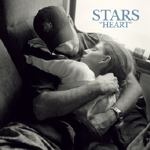 I start off skeptical about a CD that begins with each band member saying "I am {their name}, this is my heart." Sometimes wearing your heart on your sleeve is a formula for bad music, but that doesn't turn out to be the case with Stars' second album Heart. The 11 songs are all overtly about love, but two things save this from being a cheesy, uncomfortably sentimental affair: sincerity and talent. Each song perfectly articulates a different aspect of being in love (infatuation, confusion, lust, friendship, trust, etc.). The songs acknowledge the difficulties inherent in relationships while celebrating love without hesitation or shame. "Time Can Never Kill the True Heart" and "Don't Be Afraid to Sing" are two of the song titles, and the could be the band's credos. That courage to sing what you really feel inside is one of the reasons this album will affect you; the other is the catchy melodies and lush, synthesizer-soaked sound. Sounding somewhat like the best St. Etienne albums or the Magnetic Fields when they drop their armor, Heart is a very 80s-sounding pop album that has truly lovely textures, harmonies, and moments. It's a suitably gorgeous album for such a celebration of what's beautiful and alluring about love.--dave heaton
I start off skeptical about a CD that begins with each band member saying "I am {their name}, this is my heart." Sometimes wearing your heart on your sleeve is a formula for bad music, but that doesn't turn out to be the case with Stars' second album Heart. The 11 songs are all overtly about love, but two things save this from being a cheesy, uncomfortably sentimental affair: sincerity and talent. Each song perfectly articulates a different aspect of being in love (infatuation, confusion, lust, friendship, trust, etc.). The songs acknowledge the difficulties inherent in relationships while celebrating love without hesitation or shame. "Time Can Never Kill the True Heart" and "Don't Be Afraid to Sing" are two of the song titles, and the could be the band's credos. That courage to sing what you really feel inside is one of the reasons this album will affect you; the other is the catchy melodies and lush, synthesizer-soaked sound. Sounding somewhat like the best St. Etienne albums or the Magnetic Fields when they drop their armor, Heart is a very 80s-sounding pop album that has truly lovely textures, harmonies, and moments. It's a suitably gorgeous album for such a celebration of what's beautiful and alluring about love.--dave heaton
Copyright (c) 2005 erasing clouds |
|